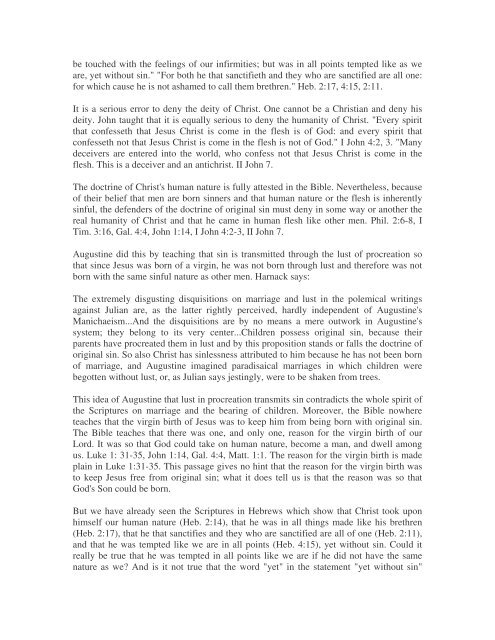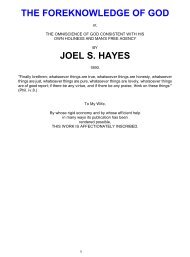Are Men Born Sinners? - Library of Theology
Are Men Born Sinners? - Library of Theology
Are Men Born Sinners? - Library of Theology
You also want an ePaper? Increase the reach of your titles
YUMPU automatically turns print PDFs into web optimized ePapers that Google loves.
e touched with the feelings <strong>of</strong> our infirmities; but was in all points tempted like as we<br />
are, yet without sin." "For both he that sanctifieth and they who are sanctified are all one:<br />
for which cause he is not ashamed to call them brethren." Heb. 2:17, 4:15, 2:11.<br />
It is a serious error to deny the deity <strong>of</strong> Christ. One cannot be a Christian and deny his<br />
deity. John taught that it is equally serious to deny the humanity <strong>of</strong> Christ. "Every spirit<br />
that confesseth that Jesus Christ is come in the flesh is <strong>of</strong> God: and every spirit that<br />
confesseth not that Jesus Christ is come in the flesh is not <strong>of</strong> God." I John 4:2, 3. "Many<br />
deceivers are entered into the world, who confess not that Jesus Christ is come in the<br />
flesh. This is a deceiver and an antichrist. II John 7.<br />
The doctrine <strong>of</strong> Christ's human nature is fully attested in the Bible. Nevertheless, because<br />
<strong>of</strong> their belief that men are born sinners and that human nature or the flesh is inherently<br />
sinful, the defenders <strong>of</strong> the doctrine <strong>of</strong> original sin must deny in some way or another the<br />
real humanity <strong>of</strong> Christ and that he came in human flesh like other men. Phil. 2:6-8, I<br />
Tim. 3:16, Gal. 4:4, John 1:14, I John 4:2-3, II John 7.<br />
Augustine did this by teaching that sin is transmitted through the lust <strong>of</strong> procreation so<br />
that since Jesus was born <strong>of</strong> a virgin, he was not born through lust and therefore was not<br />
born with the same sinful nature as other men. Harnack says:<br />
The extremely disgusting disquisitions on marriage and lust in the polemical writings<br />
against Julian are, as the latter rightly perceived, hardly independent <strong>of</strong> Augustine's<br />
Manichaeism...And the disquisitions are by no means a mere outwork in Augustine's<br />
system; they belong to its very center...Children possess original sin, because their<br />
parents have procreated them in lust and by this proposition stands or falls the doctrine <strong>of</strong><br />
original sin. So also Christ has sinlessness attributed to him because he has not been born<br />
<strong>of</strong> marriage, and Augustine imagined paradisaical marriages in which children were<br />
begotten without lust, or, as Julian says jestingly, were to be shaken from trees.<br />
This idea <strong>of</strong> Augustine that lust in procreation transmits sin contradicts the whole spirit <strong>of</strong><br />
the Scriptures on marriage and the bearing <strong>of</strong> children. Moreover, the Bible nowhere<br />
teaches that the virgin birth <strong>of</strong> Jesus was to keep him from being born with original sin.<br />
The Bible teaches that there was one, and only one, reason for the virgin birth <strong>of</strong> our<br />
Lord. It was so that God could take on human nature, become a man, and dwell among<br />
us. Luke 1: 31-35, John 1:14, Gal. 4:4, Matt. 1:1. The reason for the virgin birth is made<br />
plain in Luke 1:31-35. This passage gives no hint that the reason for the virgin birth was<br />
to keep Jesus free from original sin; what it does tell us is that the reason was so that<br />
God's Son could be born.<br />
But we have already seen the Scriptures in Hebrews which show that Christ took upon<br />
himself our human nature (Heb. 2:14), that he was in all things made like his brethren<br />
(Heb. 2:17), that he that sanctifies and they who are sanctified are all <strong>of</strong> one (Heb. 2:11),<br />
and that he was tempted like we are in all points (Heb. 4:15), yet without sin. Could it<br />
really be true that he was tempted in all points like we are if he did not have the same<br />
nature as we? And is it not true that the word "yet" in the statement "yet without sin"






